
This talk was given 22 June 2010
The text here may not be identical to the spoken text
CHARTERED INSTITUTE OF HOUSING
AGM
22 JUNE 2010 HARROGATE
So
cuts and housing. The very first piece I ever wrote for publication outside
university was about housing – specifically about homelessness. I suppose my
rather odd career can be dated from that moment. Although I am a financial
journalist my background is in the finances of the people who don’t have much
money. If you are rich you can afford an accountant or a financial adviser. If
you are on average income or below you can’t – you're stuck with me.
So
I am very glad to be here talking about housing. But before I talk about housing
I must talk a little about debt. Government debt is very big and can seem very
complicated. But it’s not. It’s just like personal debt, family debt, that we
have all had or, perhaps in our professional lives, all seen get out of hand.
There is nothing wrong with debt. Debt helps us manage our income, even it out
over time and buy the things we want but can’t afford. So some debt – debt of
the right sort – is fine if it is to cope with the ups and downs of life. For
example Christmas comes once a year so you might borrow a bit to afford that and
then pay it back. A holiday – perhaps this year an expensive one – ditto. Or a
new baby arrives. Or you move house. Those are examples of lumpiness in our
spending.
Income can also be lumpy. You may get a bonus or a bonus you expected may not
materialise. Or you may have a spell of unemployment. Or your partner has time
off sick and earns less. So income also goes up and down. And borrowing to tide
you over those hills and valleys is fine.
And
it is the same with the government. There is a business cycle – no-one quite
knows why – it’s like the long slow swell on the sea. As business does well the
wave of tax receipts rises above government spending and in the bad years tax
receipts fall and the government borrows to even out the waves.
Or
it should.
But
there is another sort of debt. On a personal level it is when you start paying
for your groceries on your credit card and don’t pay it off at the end of the
month. When you take a second holiday before you’ve paid for the first. When
your income is less every month and every year than your expenditure. And your
debt, instead of smoothing out the normal ups and downs of financial life, just
gets bigger and bigger and bigger.
And
if you are already spending more than you should, you’re a bit overstretched
year after year, then you get a sudden financial shock – unemployment,
relationship breakdown, major illness – or perhaps more relevant the bank
suddenly withdrawing your mortgage – that leaves a big problem to be dealt with.
And
that is what happened here.

Source: Pre-Budget forecast, Office
for Budget Responsibility June 2010 p37
You
can see here the black line that is mainly at the top is our spending, the dark
blue line mainly at the bottom is government income. The grey box represents
predictions. And you can see that it has been more than expenditure fairly
constantly for a very long time but recently it has really taken off.
And
that sudden increase in our deficit is the damage done by the financial crisis
of 2008. Although the government had been spending too much it was not on a
crisis scale. But it was on a scale which meant that the crisis and the costs of
it could not be accommodated.
The
annual overspend is called our deficit. And there are two parts to it. There is
the cyclical deficit – that’s just the smoothing out of our finances year by
year. And there is the structural deficit – that is the underlying overspend.
The amount that represents living beyond our means. Now some structural deficit
is normal. But we have suddenly got a much large deficit because of the
financial shock which the economy had to deal with.
The
latest figures show that the deficit will be about £155 billion this year
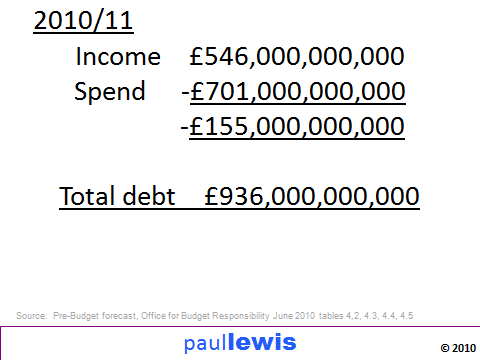
The
debt is the total of all those deficits. And again that is put at £936 billion
this year.
And
here it is worked out as an amount per adult – each one of us in the country.
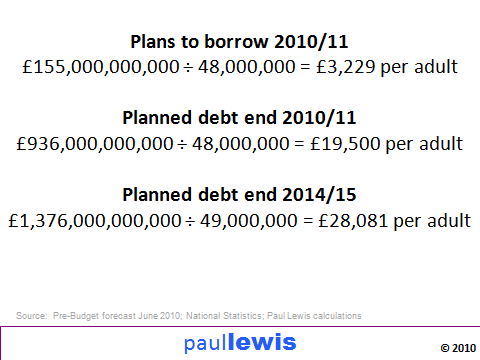
And
even on present plans – before today’s announcements – that debt is going to
grow. Because however you tackle the overspend you won’t get rid of it in one
year even in five years. So it will grow.
It
is this structural deficit – the underlying overspend or at least the part of it
caused by the recent crisis – that is being targeted by the coalition
government. The Institute for Fiscal Studies says that is about £74 billion
rather than £69 billion that was estimated at the March Budget. So although last
Monday’s figures from the new Office for Budget responsibility found some
improvements to our finances, it showed that this problem deficit was rather
bigger than we thought.
And
the coalition government seems set to announce in an hour or so that at least
this emergency structural deficit will be eliminated in the next five years. And
it may move towards having a much smaller or no structural deficit at all. That
could mean cuts of between £75 billion and £85 billion over five years. That is
a huge target. It means cutting up to one pound in every eight of everything the
government spends.
Now
some of you may have seen my presentation at the Wales CIH meeting two months
ago. If you want to read it, it is on my website. The essence of what I said
then about reducing the deficit is that out of the £701 billion spending a lot
of it is sacred. The most sacred of all, I’m sorry to say, is the £42.1 billion
in debt interest this year which will rise to £67.2 billion by 2014/15. Now that
figure seemed to come as a surprise to David Cameron when the OBR published its
report. It shouldn’t have done. It was available and indeed it was published by
me at the Welsh CIH meeting.
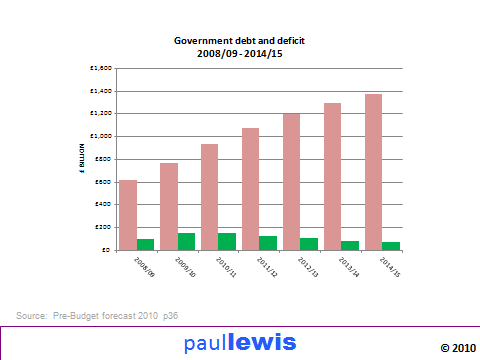
Now
there is little we can do about the debt interest. It rises for two reasons.
First our debt will continue to get bigger – remember that cutting the deficit
means that the overspend will be less each year but it will still be an
overspend. So the total debt will carry on growing. It will just grow more
slowly. The second reason is that as the people who lend us the money get more
worried about our growing debt they charge us more. Just as an individual with a
poor credit rating pays a higher rate for a loan. And one thing we cannot not
pay is the debt interest.
Now
this year the £42 billion is as much as we spend on defence. A third of what we
spend on the NHS. Just on servicing our national debt.
And
it’s not just debt interest that is protected. Spending on the NHS is not being
cut either. Indeed the coalition has promised it ‘will rise in real terms in
each year of the parliament’. So it will rise by more than inflation. Now that
is not to say it will rise enough – it has to rise 1.6% a year just to stand
still. So it may feel like cuts but it won’t be. And overseas aid will also be
protected rising to its target level by 2013 – now that is a big rise but it’s a
small amount of money.
But
everything else is in line for cuts. And that includes the previously protected
amounts on welfare benefits. We have already seen speculation that housing
benefit – help with rent – could be cut. Child benefit currently paid for every
child in the country – could be means-tested or taxed. Even winter fuel payments
– which the coalition has said it would ‘preserve’ – may not be fully protected.
And we know there has been discussion of a complete benefits freeze – for a year
or maybe more. That would almost certainly exclude the
basic state pension. But everything
else including pension credit, SERPS, bereavement benefits, disability benefits,
could be frozen. And with the RPI at 5.1% and projected to be still as high as
3.3% by September when benefit rates are fixed – that would represent a real cut
in the weekly money paid to millions of people, most of whom by definition – by
any definition – are poor.
Apart from benefits it includes absolutely everything else – including public
sector pay and pensions. Including defence. Including the police. Including
schools. Including universities. And of course including housing and the
spending of local councils.
Calculations vary but suggest that, depending what happens with welfare
payments, other spending that is not protected would have to be cut by about 25%
by the end of the parliament 2014/15.
And
on the other side there will be tax rises. Again, we are in the realms of
speculation. But to raise serious money you have to increase the taxes that are
paid by most of us – Value Added Tax which could go up or be extended its scope
to the things that are currently zero rated or exempt such as food or children’s
clothes. Not income tax because that has not been raised since it was put up to
35% in 1975. Since then it has only come down, despite being the fairest tax.
But National Insurance paid by everyone in work is also a likely candidate. That
is a soft way to raise a tax on income.
So
taxes will rise and that will harm low income people as much as or more than
those on higher incomes.
At
the end of the Budget we will know more – but not everything. The cuts in
departmental budgets almost certainly won’t be announced until the Autumn. We
will know the overall figure today but where the axe will fall won’t be decided
just yet.
But
we do know that the people making the decisions are politicians. And they will
tend to push those decisions onto others if they can. And particularly they will
push them down to local politicians. So expect big cuts in local government
budgets. Already we have been told that council tax will be frozen in England at
least – though how that will work is not clear. That will take money away from
local councils and leave them to work out how to do it.
And
all of that will mean big cuts in housing programmes.
The
National Housing Federation estimates that there will be cuts in housing budgets
up to 32%. That would reduce the number of affordable homes being built over the
next nine years from 426,000 to 285,000. There are 4.5 million people waiting
for an affordable home, 2.6 million people estimated to be in overcrowded
conditions. And 1.8 million on local authority housing waiting lists.
Let
me look at the broader housing market – not just what we rather glibly call
affordable homes. In London ‘affordable’ is a technical term which does not mean
anyone on an ordinary income can afford it.
So
house prices. One of the abiding interests of Money Box listeners.
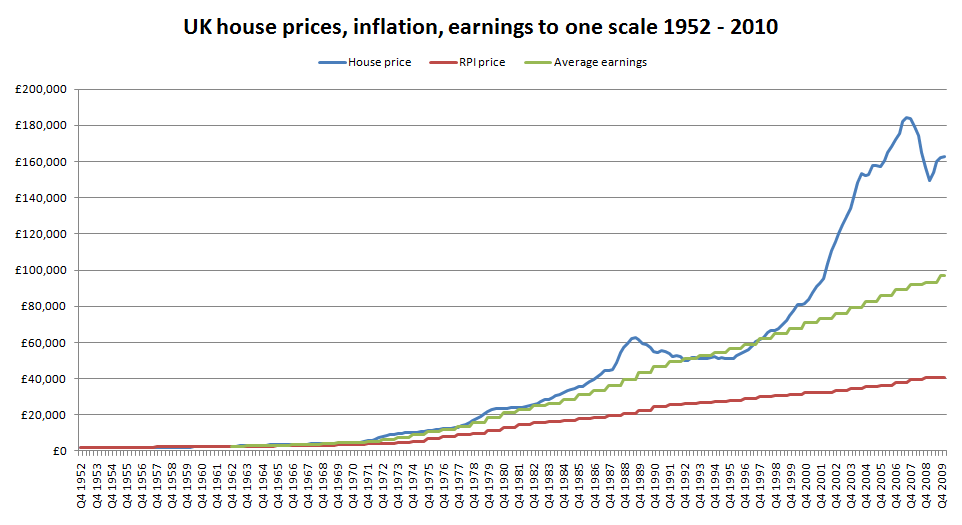
Here is what has happened to house prices over nearly the last fifty years since
1952. Figures from Nationwide. There are others but they all show much the same.
And
we can see that overall the trend for house prices is up. There have been two
occasions when they fell. They peaked in Q3 1989 then they fell for 14 quarters.
And it took another 9 quarters to rise back to where they were. Then they peaked
in Q3 2007 and fall for 7 quarters and then rose so far for the next three.
They’re still rising. But is this a bubble?
In
one sense clearly not prices did not collapse they fell sharply but they soon
began to rise again. And we can see how house prices have risen compared to
retail prices. This series goes back to 1952 as well. And you can see that since
the 1970s at least houses have been a great hedge against inflation. Rising in
real terms very strongly.
But
that doesn’t tell us anything about whether they will fall again. More important
we are told is how house prices compare to earnings. After all it is earnings we
use to justify the loan we take out to buy them.
So
here in green is earnings. They start from 1963. And you can see that they
pretty much follow a smoothed out line like house prices and when prices got out
of kilter with them in the late 1980s they soon fell back to fit in with
earnings.
But
now it is very different. They have taken away quite separately from earnings
and far from plunging back down to earnings they are still way above them. If
they were back to where they were in 1963 the average home would cost around
£100,000 not more than £160,000. So are they really that overpriced?
Halifax says that the average home costs 4.63 times average full time male
earnings. And many people say that is unsustainable that prices must fall so
that people can afford them.
But
there is no rule that says the price of houses has to be low enough that
everyone can afford them. Suppose there was a weapon which could destroy a
million homes overnight without harming any people. But wages stayed the same.
Would house prices stay the same? No. They would go up. Because there would be
less homes. Because although there is no rule that says average earners have to
be able to afford a home there is a rule that says if the demand for a product
exceeds the supply then the price will rise. It is the e=mc2 of
economics – supply and demand.
And
every figure we have shows that there are too few homes for the people who need
them. Not just homes to buy of course but all homes in all tenures.
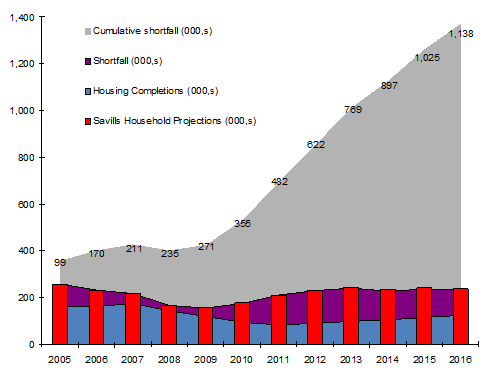
Here is a projection by the admittedly upmarket estate agent Savills. It shows
how household formation is growing much faster than the number of homes that are
being built. It predicts that by 2015 there will be a shortage of more than a
million homes. And the steepness of this graph shows that the problem will get
worse and that will drive up prices.
Last year we built 122,000 new homes – the lowest number since the 1920s.
But
surely, people say, if these new households can’t afford a home then demand
falls and prices will follow. In the past they have afforded it because banks
and lenders have given 100% mortgages at huge multiples of annual pay. That is
no longer happening. So if people can’t borrow what they need prices will fall –
they may want a home but they do not created demand because they cannot enter
the market. That might be true if Britain was an island. Now I know it is an
island but it is one which is linked to the rest of the world by countless
bridges.
And
figures from published again by Savills in June showed that 55% of the homes it
sold for more than £750,000 were sold to foreign buyers. That compares with only
45% of those homes sold to foreign buyers at the price peak. It is partly
fuelled by the weak pound which makes the prices seem more attractive to those
with foreign currency to spend. Savills estimates that property prices are about
10% below their peak. But if you have US dollars or euro they are 30 or 33 per
cent below their peak. So they seem very attractive.
Now
this affects particularly London and only as I said high end properties. But the
price of those tends to pull the whole market up. And remember £750,000 will
only get you a modest three bedroom home in much of London and not even that in
some parts.
And
even if demand is limited by the lack of finance or affordability, there is
another factor that keeps prices high.
Prices are currently 10% below their peak. People with homes who have seen them
at one price two years ago are very reluctant to sell for what they see as too
low a price. So homes are kept off the market. So even if demand is controlled
by the banks lending policies supply is also controlled while prices are below
their peak.
So
this gap on the graph between wages and average prices of a home does not mean
that prices are going to crash. We are short of homes, the finance or the
foreign buyers are there for enough of those who want to buy to keep prices
high.
HOUSING TENURE
One
factor that keeps up demand is the way housing is organised in the UK. For most
people there is only one way to have a secure home – buy it. If you pay the
mortgage eventually you will own it and then you can stay there. If you retire
and your income falls you still have a home. Yes you have to pay for repairs and
insurance but you will not be evicted.
That security does not exist in the private rented sector except for a dew very
elderly people who have lived in their rented flat for decades. But when I was
young – to return to the start of my talk – tenants did have security of tenure.
And the state did control rents. So with reasonable rents and a secure home the
urge to buy was far less.
Today a new secure shorthold tenant has security for six months. Even if they
pay their rent on time the landlord can evict them for no reason with two
month’s notice.
One
way to reduce the demand on housing and ironically to make it more affordable
would be to restore security of tenure and rent control. And it would save
public money. At the moment with no rent controls landlords can often get their
high rents paid for wholly or partially by the state through housing benefit. We
may well see cuts in HB later today. But that will only make the position of
private tenants worse if it is not matched by rent controls and security of
tenure.
Of
course in the public sector tenants do have security. But for how much longer
will that apply to new tenants? Housing Minister Grant Schapps told Parliament
on 10 June
Grant Shapps:
As I have said, security of tenure is incredibly important, particularly for
people in social housing, and we are keen to protect that. There are 1.8 million
families languishing on that social housing waiting list, and it is right and
proper that we look at the way in which we can reduce that list. It may include
looking at tenure for the future. (col 451)
As
I understand it that does not mean taking security away from existing tenants
but only giving those on the waiting list a home on a shorthold tenancy rather
that with security. I am not quite clear how that helps provide more homes for
them – at least on a permanent basis – but that is certainly on the agenda. And
it does seem a less than convincing statement of future government commitment to
security of tenure for social housing tenants.
To
sum up.
Cuts are coming. They will be worse than anything we have seen before. And they
will inevitably hurt most those who can bear them least.
The
only answer to the unaffordability of housing is to build more, to raise supply.
And to reduce demand by making tenancy more attractive. There is no indication
either of those things is going to happen. So house prices will keep ownership
out of the reach of many. And reforms to rented accommodation will not happen.
Housing is not a priority of any government. So overcrowding, under investment
and waiting lists will get worse. And local authorities will be blamed.
And
if you think that’s depressing wait till you hear George Osborne in an hour or
so.
Thank you.